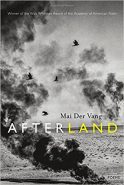
Book Review: Afterland by Mai Der Vang
Reviewed by Beth Sutton-Ramspeck and Doug Ramspeck

Afterland
Poems by Mai Der Vang
Graywolf Press, April 2017
$16.00; 104 pp.
ISBN-13: 978-1555977702
All poems bear witness, but of what? Sometimes it is of the personal, while other times the political, the historical, or the cultural. But in many cases, the lines blur between the individual and the public, the witness and the witnessed, such as when Yevgeni Yevtushenko writes in his famous poem, “Babi Yar:”
No monument stands over Babi Yar.
A drop sheer as a crude gravestone.
I am afraid.
In Afterland, winner of the Walt Whitman Award for the Academy of American Poets, Mai Der Vang bears witness to the Secret War in Laos, the Hmong exodus from the country at the war’s conclusion, and the life of the Hmong as refugees. The poems navigate seamlessly between the experiences of the speakers and the larger contexts, sometimes overtly, such as in the poem “I the Body of Laos and All My UXOs.”
It is been forty years of debris
turning stale, and submunitions
still hunt the patina of my mind.
This poem, like many in the collection, is itself a kind of UXO (unexploded ordinance), just on the edge of detonating. It weaves together past and present, images of the body and of the Southeast Asian landscape, war and memory, all while “a smuggled / climate spills over my body, taints me / with cobwebs spun from overseas.”
Many poems also bear witness to the Hmongs’ past. In “I am the Whole Defense,” the speaker is an eighteenth-century woman who single-handedly holds off an army for two months, after all the soldiers in a garrison, including her husband, have been killed. And how does she do this?
I teach boulders
To trickle from the cliff.
As for witnessing the refugee experience, the poems swing between disillusionment and wonder. “Beyond the Backyard,” for example, emphasizes loss:
Rusted sedan, wire zipline
to stapled roof, retired
shopping cart missing wheel.
My parents fled for this.
Nevertheless, in “Sojourn with Snow,” a young “evacuee from a rainforest” is filled with awe:
It’s like tiny diamonds
that turn to water
Taste like ice Try it
Perhaps in the literature of witness the intent is psychological and political and historical simultaneously, the desire to grieve and to heal and to protest and to honor. And in these moving and deft poems by Mai Der Vang, the intertwined landscapes of time, place, and self are dreamlike and discursive, evolving and devolving, imbued with memory.
Beth Sutton-Ramspeck is an Associate Professor of English at the Ohio State University’s Lima campus, where she teaches nineteenth-century British Literature. She is the author of Raising the Dust: The Literary Housekeeping of Mary Ward, Sarah Grand, and Charlotte Perkins Gilman and the editor of Marcella, by Mary Ward, and Herland, by Charlotte Perkins Gilman.
Doug Ramspeck is the author of six poetry collections and one collection of short stories. His most recent book, Naming the Field, is forthcoming by LSU Press. Individual poems have appeared in journals that include The Southern Review, The Kenyon Review, Slate, and The Georgia Review.

Leave a Reply